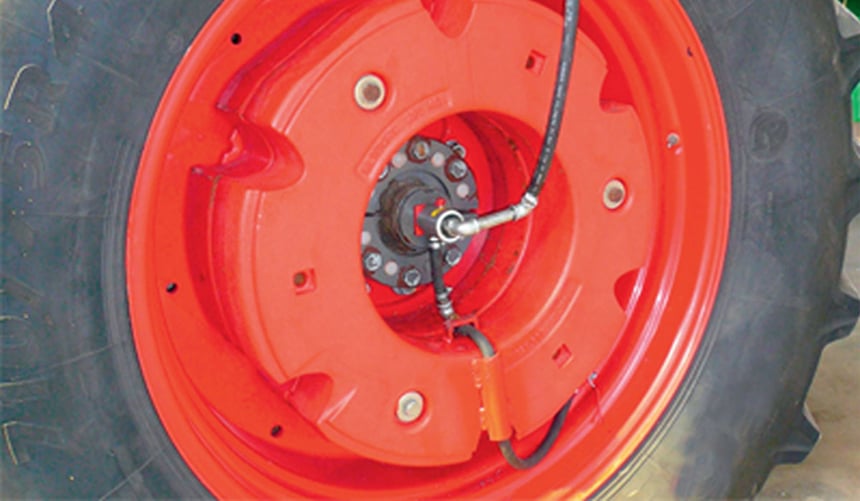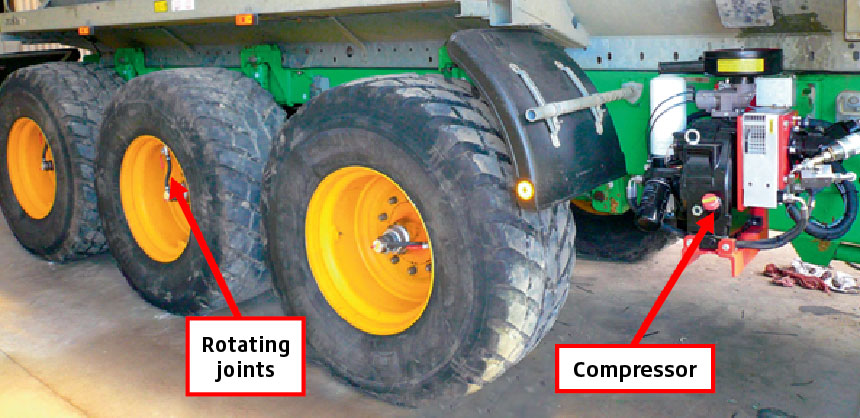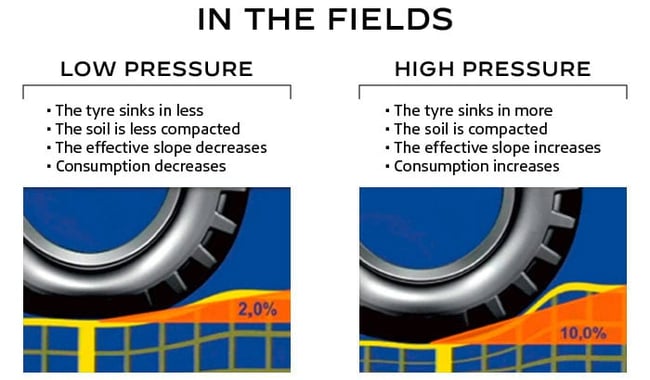Adjusting your tyre pressure is essential to optimise your agricultural tyres, save fuel and improve your productivity.
However, it must be adjusted significantly and systematically depending on its intended use, making it difficult to choose the right pressure (without forgetting that this isn't normally calculated properly due to time constraints).

A low pressure is much more preferable for field work, because it minimises compaction and slip and improve comfort.
On the other hand, a high pressure is strongly recommended for road journeys as it reduces rolling resistance, fuel consumption and tyre wear while also improving the vehicle's stability. So what pressure should you go for if your tyres will be use both in the fields and on the road?
Farmers usually opt for a compromise at the expense of soil compaction or tyre life span, or sometimes even both.
To remedy this problem, a remote inflation system is a cost-saving solution over the long term.
Remote inflation is a system that's installed on your agricultural tyres to adjust their pressure during use, depending on their current requirements and within only a matter of minutes. It is controlled directly from the tractor cab thanks to an electronic control module (OCP) that is used to display and configure tyre pressure.
The remote inflation system is composed of rotating joints, which allow air to pass between the fixed axle and turning wheel, and a compressor. The compressor is the key component of remote inflation. It's sometimes already present on tractors equipped with pneumatic braking systems, but if not it must be installed on machines lacking a compressed air generator.
An additional compressor can also be used on tractors already equipped with one to reduce the inflation time.
 Remote inflation system installed on a triple axle trailer
Remote inflation system installed on a triple axle trailer
Despite their initial cost, remote inflation systems are well worth looking into because they mean your agricultural tyres will always be at the perfect pressure for their conditions of use.
Generally speaking, fuel consumption will be lower in the field thanks to the low pressure used, which reduces slip, and on the road thanks to the high pressure used, which reduces rolling resistance.
Using your tyres at the optimum temperature will save you precious time. It'll also mean your tractor can use less power to haul your equipment, increasing your tyres' life span.

Besides this, reducing tyre pressure in your fields will minimise the impact your equipment has on the soil (less compaction and shearing) and extend your intervention windows (e.g. you'll be able to work the soil when it's wet) while obtaining the best yields from your soil by preserving your crops' root networks. The groundwork needed to aerate and restore the soil after compaction is thus greatly reduced.
Finally, remote inflation improves your comfort and personal safety. Applying a low tyre pressure in the field absorbs more vibrations, reducing back pain and farmer fatigue and the health impacts of these, whilst a high pressure on the roads stabilises the trajectory and improves braking performance, allowing you to drive in complete safety.
To go further and learn more about what poses risks to your health and safety, Bridgestone agriculture offers you a very detailed free eBook that explains all the risks associated with driving agricultural machinery:
The most people who have read this article have also read the following articles, which are listed below in order of popularity:
This information is intended only to make you aware of the technical and functional aspects of agricultural tires and their use. It does not allow you to make a judgment or a definitive conclusion on a given problem. Only your agricultural tire expert is able to make a technical assessment and take a final decision, case by case.

BRIDGESTONE EUROPE NV/SA
AG Department
Leonardo Da Vincilaan 1
1930 Zaventem | Belgium
Our regional office:
Athena Drive, Tachbrook Park
Warwick CV34 6UX
United Kingdom